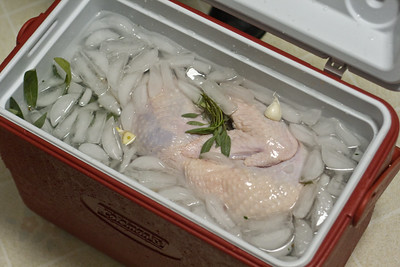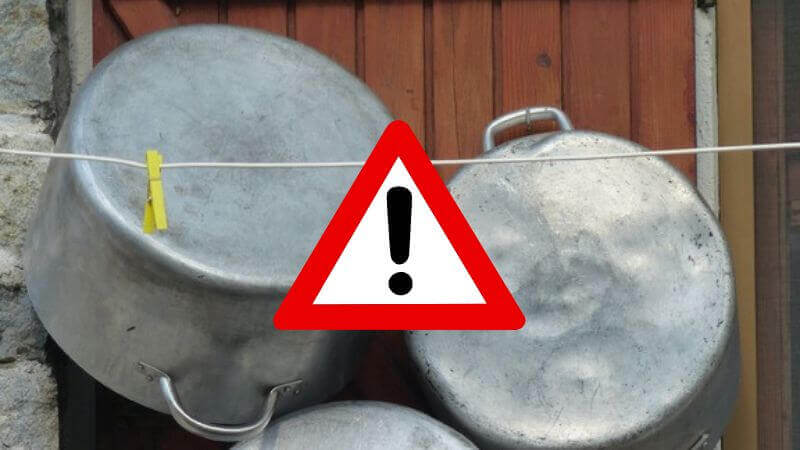Cooking a turkey is always like going big or going home. It doesn’t matter how often you’ve cooked it; it always feels like the first time.
During the sophomore year, I hosted Thanksgiving for my college friends. I had brined the turkey in a big aluminum stock pot. And that’s what led me to write this article today after all these years!
How did it go? Keep reading to know!
Table Of Content
Can You Brine A Turkey In An Aluminum Pot?
No, you cannot brine a turkey in an aluminum pot. You could use a stainless steel pot instead. The salt present in the brine will react with aluminum, resulting in the creation of aluminum oxide. This won’t just impart a metallic taste to your turkey but also increase the risks of heavy metal poisoning.
So, you can guess what happened to my turkey. The turkey had a strong metallic flavor and smell that made it completely inedible. It went straight into the trash bin.
I learned my lesson the hard way. So much for my happy ending.
Recommended Readings!
How Many Shots Are In 200ml? It’s 2 Shots In These Countries!
Frozen Chicken Left Out Overnight! Cook Or Throw Away?
Why Does Taco Bell Make You Poop? 6 Reasons Why!
Why Can’t You Brine A Turkey In An Aluminum Pot?
Brining a turkey involves salt – a whole lot of salt. And when salt interacts with aluminum, the combination creates a chalky, white coating of aluminum oxide. To say the least, aluminum oxide gives the turkey a metallic taste and smell, making it not so scrumptious.
Worst case scenario – you could suffer from aluminum oxide poisoning. You will experience nose, throat, and lung irritation with coughing, wheezing, and shortness of breath.
Matter of fact, aluminum oxide ranks among the least toxic substances and only shows harmful effects in high concentrations.
So, eating a turkey brined in an aluminum pot once may not be downright dangerous to your health. But don’t make it a habit either.
If you feel uneasy after eating turkey brined in an aluminum pot, seek medical help right away. This could potentially be life-threatening.
Salty water causes the corrosion of aluminum – resulting in the creation of aluminum oxide. While the salt does not directly attack the aluminum, it causes an electrochemical attack like a catalyst – resulting in corrosion.
Naturally, the corrosion rate is subject to factors like humidity level, temperature, and salt concentration.
Actually, aluminum is an extremely reactive metal. It is almost never found in an elemental state in nature. In the presence of oxygen in any form, it immediately binds with the oxygen and creates a practically impervious layer of aluminum oxide.
In our everyday life, we’re exposed to aluminum oxide in very small amounts. It’s even found in tablets used to treat the signs of heartburn.
What Utensil Can You Use To Brine A Turkey?
There are plenty of options. You can use glassware, food-safe plastic bags and boxes, ceramic pots, and stainless steel.
Yes, stainless steel. And that’s because it’s corrosion-resistant. It is made with an alloy of chromium, nickel, iron, and some other metals.
As stainless steel is corrosion-resistant, it will not react with salt and cause complications.
Below, I’ve shared some answers given by hobbyists on the subject – quirky, insightful, and useful – have a look!
Can You Brine A Turkey In An Aluminum Pot? Real Answers By Real People!
“I personally never use aluminum or any other kind of metal. I use big plastic boxes that are approved for food storage.”
“You can’t go wrong with food-grade plastic and glass containers as they are insulators. They won’t react chemically with the brine solution. Don’t use aluminum or iron.”
“Aluminum pots are a no-no. Go for a stainless steel pot. They’re non-reactive.”
“Never put brine in a metal pot. The brine solution will interact with the metal and do funny things.”
“No, you can’t. The aluminum will react to salty solution and create aluminum oxide. Use plastic, ceramic, or glass – but never metal.”
“When you brine, it’s a MUST to use a non-reactive pot.”
“Aluminum is highly reactive.”
“I’ve been using a large stainless stock pot for years and will do so again. No funky flavors.”
“I’ve used medium-sized plastic coolers with success. Be careful while draining.”
“I don’t use aluminum or any other metal. I use a special ziplocking brining bag that’s available in the grocery.”
“I think one of the best ways to do it would be in a clean 5-gallon bucket.”
Turkey Brine Recipe

Brining is a technique in which the meat is immersed in a mixture of salt and water. Sometimes, other seasonings are used too. Turkeys are brined for several hours before cooking.
Actually, turkeys make a good candidate for brining since the meat is quite lean and thus doesn’t have a lot of fat to keep it moist while cooking.
Here are a couple of reasons why turkeys are often brined before cooking:
- The salt will season the meat from the inside out.
- The salty solution will break down the protein and make the meat more tender.
- The water mixture keeps the turkey moist while in the oven.
But before brining the turkey, you first need to check if it’s already been brined. That’s often the case because turkeys lack moisture.
Turkeys are often injected with a brine solution to add moisture. A turkey that hasn’t been brined will be labeled as “natural.”
Use a non-reactive pot, like stainless steel, glass, or ceramic pot, for brining.
The rule of thumb is to add 1 cup of salt for every gallon of water. Use kosher or sea salt. If you plan to use small-grain salt, you can cut the amount by half.
What you need:
- 1 whole turkey, thawed
- 2 cups kosher or coarse sea salt
- 2 gallons water
First, mix 2 cups of salt in 2 cups hot water and stir. Once the solution cools down, pour it all over the turkey (I’m assuming your turkey was in the designated box in the first place.)
Next, add the remaining water. Finally, weigh down the turkey with a ceramic plate if it floats.
Toss the turkey in the refrigerator for 8-24 hours.
The turkey should be removed from the brine solution at least one hour before you roast it. Don’t forget to rinse it thoroughly with cold water and pat dry inside and out.
Frequently Asked Questions
Can You Brine Turkey In A Pot?
You can brine the turkey in a ceramic, food-safe plastic, or glass pot. You could also use a stainless steel pot. However, shy away from using iron, aluminum, and copper.
What Are Some Of The Non-Corrosive Container Examples?
Some examples of non-corrosive containers are glass containers, ceramic pots, food-safe plastic boxes, and stainless steel containers.
Final Words: Can You Brine A Turkey In An Aluminum Pot?
Unfortunately, no – you cannot brine a turkey in an aluminum pot. This is because the salt from the brine will react with the aluminum to create aluminum oxide.
And mind you, aluminum oxide won’t just make your turkey taste metallic but also expose you to the risks of heavy metal poisoning.
Brine your turkey in a stainless steel pot. This is the safest bet!
Recommended Readings!
How Many Ounces Is A Cereal Bowl? The Answer May Surprise You!
Can You Mix Tequila And Vodka? Is It Even Safe?
Can You Brine Turkey In A Metal Pot? Risk Of Heavy Metal Poisoning!
